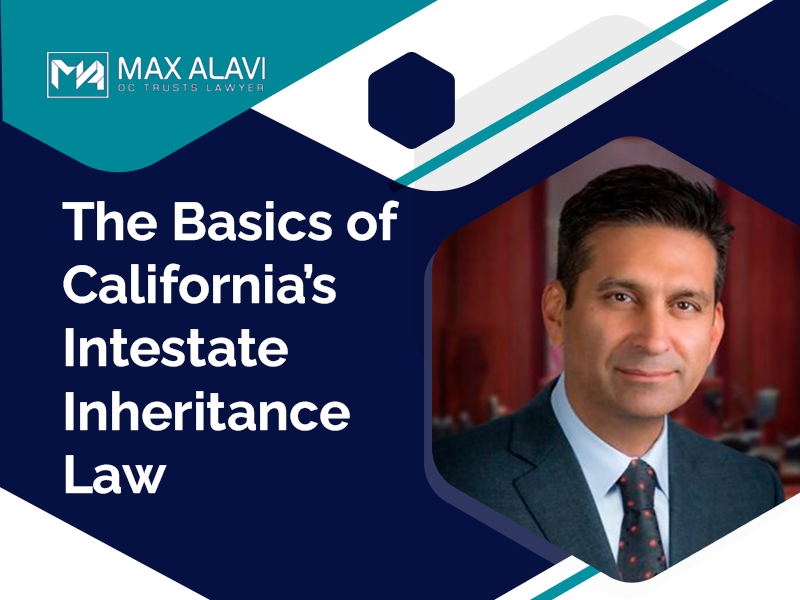What happens to your estate if you die without a will in place, or without your assets being properly assigned to the will on file? According to California’s intestate succession laws, there may be situations in which your assets are divided among surviving relatives, simply on the basis of your relationship to them. Your assets will likely pass first to a surviving spouse, then children, and finally parents or siblings. To learn more about California inheritance law, connect with Max Alavi APC, OC Trusts Lawyer.
The Basics of California’s Intestate Inheritance Law
What happens to your assets if you die without a will in place, or without your assets being properly assigned to the will on file? According to California’s intestate inheritance laws, there may be some situations in which your assets are divided among surviving relatives, simply on the basis of your relationship to them. Basically, if you die without properly naming heirs and beneficiaries, interstate laws take over.
Here’s what California residents should know about this inheritance law, also known as intestate succession.
Intestate Succession in California: Covering the Basics
Your Spouse
You might assume that, if you die without naming heirs or beneficiaries, all of your assets will go immediately to your spouse. This isn’t quite the case.
According to California’s intestate succession law, if the deceased person was married and has no living children, their spouse will inherit the entire estate. If the deceased person was married and does have living children, the spouse will inherit half of the estate, with the children inheriting the other half.
Your Children
According to inheritance law in California, if you die and do not have a living spouse but do have living children, then your children will inherit the entire estate. The estate will be decided and allocated between them in equal shares.
Your Parents
Intestate succession laws also dictate that, if you die without a living spouse or children, your assets will then go to your parents.
Your Siblings
In the event that you die without a living spouse, children, or parents, then your estate will go to your siblings. It will be divided and allocated between them in equal shares.
The State
Should you die without a will in place, and without any living relatives at all, then your estate will pass to the State of California itself.
Exceptions and Other Guidelines
What we’ve outlined here is the general rule of California’s intestate succession laws. However, there are a number of exceptions and special circumstances, which make it essential to talk with your estate planning lawyer about your specific situation.
For example:
- If you name a beneficiary or heir but that person dies within 120 hours of your own death, that person is not considered to inherit your estate.
- Immigrants, regardless of their legal status, may inherit assets through California’s intestate succession process.
- If you die due to nefarious causes, the person who caused your death may not inherit your assets, even if they might otherwise be named your successor via California’s inheritance laws.
- There are certain types of assets that are not encompassed by intestate laws and may pass directly to a named heir or beneficiary. Examples include life insurance policies, retirement accounts, bank accounts, and living trusts.
Using Living Trusts in Your Estate Planning
Intestate succession laws provide some guidance regarding the allocation of assets upon your death. To gain greater control over how your estate is distributed upon your death, a living trust may be the solution.
Max Alavi APC, OC Trusts Lawyer, has significant experience helping individuals establish effective estate planning through living trusts. Schedule a consultation today in order to discuss the best ways to meet your CA estate planning goals.






